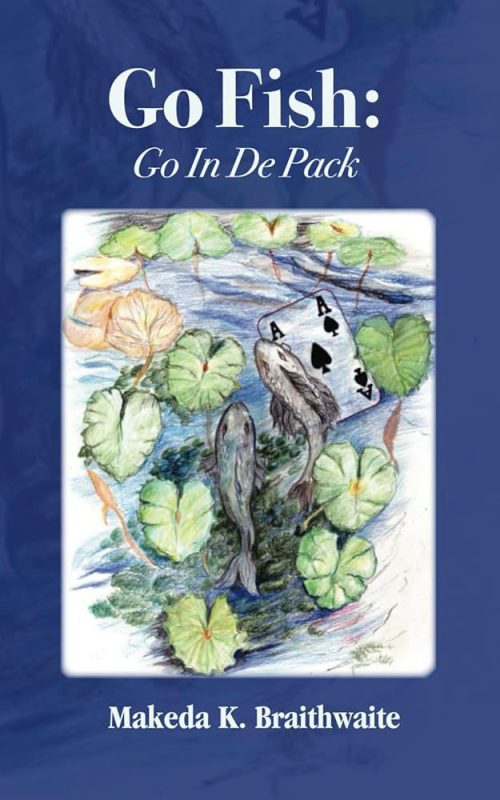 [Makeda Braithwaite, Go Fish: Go In De Pack, Bamboo Talk Press, Port-of-Spain, Trinidad, 2024. 101 pp.]
[Makeda Braithwaite, Go Fish: Go In De Pack, Bamboo Talk Press, Port-of-Spain, Trinidad, 2024. 101 pp.]
Makeda K. Braithwaite’s first collection of poetry, Go Fish: Go In De Pack, is a work of very special merit. It was on the Shortlist for the Guyana Prize for Literature Best First Book of Poetry 2023, and highly commended by the Jury as one of only four books shortlisted overall.
Braithwaite is an extraordinary talent. Remarkably, a year ago, she was awarded the Third Prize in the Guyana Prize for Fiction 2022 with her first collection of short stories An Anthology of Shivers, entered as an unpublished manuscript. It is interesting to note that in 2022 Chairman of the Jury Funso Aiyejina in his citation described her as “one to watch” among emerging Guyanese fiction writers. It can be said that he called it correctly, since an entirely different panel of Jurors headed by Evelyn O’Callaghan, singled out her poetry collection, also an unpublished manuscript, Go Fish: Go In De Pack, to be shortlisted for the Poetry Prize.
 What is encouraging for readers is that the book is not a heavy, imposing document; it is a fine collection, easy to read and a very lively, articulate volume. But that is, itself, deceiving because, while delightful and not hard to read, it is difficult to digest in one short reading. It is a work of some depth, engaging attention on a cross section of issues, intriguingly treated by a writer who is exceptional as a poet with promise and originality.
What is encouraging for readers is that the book is not a heavy, imposing document; it is a fine collection, easy to read and a very lively, articulate volume. But that is, itself, deceiving because, while delightful and not hard to read, it is difficult to digest in one short reading. It is a work of some depth, engaging attention on a cross section of issues, intriguingly treated by a writer who is exceptional as a poet with promise and originality.
The poems are terse, spare and fairly well edited, noted for economy of language. While not over-reaching in attempts at artful versification, the poems are highly commendable for their poetic qualities, charged with meaning, imagery and innuendo. These are fine lines arranged among poems that are not listed by their titles in a table of contents. They are distributed around seven sections, giving an impression that the poet is interested in groups – in grouping the poems in a way that may be more important than the individual titles and indeed, each section is focused on the treatment of a subject or theme.
And Braithwaite covers quite a range. There is the personal. The autobiographical, family ancestry, public affairs, some national topics and several of universal interest. The collection is quite markedly a first book assembled by a young poet and accordingly includes some of the usual topics like love, relationships, the family, landscape, excursions, religion and romance. But the reader soon learns that relationships are not necessarily synonymous with romance and neither will necessarily be about love.
Yet the poet treats themes with considerable depth, and several poems are preoccupied with identity, history, slavery, colonialism, national affairs, belonging and its antithesis – unbelonging, corruption, race, class and rape. As such, treatment is often grounded in post-colonialism, feminism, existentialism, with language that sometimes excite with touches of sensuality and eroticism.
Within the seven parts of the book there are outstanding sections: One, Two and Three, with Two and Three the most memorable. Poems tend to have a tragic edge to them throughout. There is irony, especially tragic irony. The personae often find themselves in engagements that are mistaken for love, sometimes, whether through pretence, deceit or downright ignorance, assumes love but often merely masquerade the real thing. Thus, some poems reveal a counterfeit and repeatedly, the disappointment of the persona.
In delivering these expressions Makeda Braithwaite has a command of poetic craft that makes her one of only two truly outstanding young Guyanese talents in fiction and poetry to have emerged at the high national level since 2015. She is only the second of this kind of stature since Subraj Singh, who won the Guyana Prize First Book award in 2016. Following Singh she is therefore a new voice in Guyanese poetry and fiction, creating a literature that gives an interpretation of contemporary times in Guyana.
Braithwaite is a poet dissatisfied. Her verse echoes a strong discontent with the society and its inhabitants. Only one or two poems present a picture of her father and mother and those reflect robust bond and normalcy in a family, so one is left wondering what went wrong. What is responsible for creating the kind of disturbed state of contemporary environment that dominates this book? Love relationships are spoilt by a persistent underlying taint, often abuse, male selfishness and misogyny.
The poem that gives the collection its quaint, unusual title is adequately illustrated by artist Barrington Braithwaite and is about a card game “Go In De Pack” played by Guyanese. But even this poem, one of the most moving poems in the book, finds the persona dissatisfied and questioning, dealt a harsh hand by luck, but more by an unequal, unfair society. The poem ends in irony as the winning card she sought was at the very bottom of the pack.
Here we witness the rise of a fresh, new voice in Guyanese poetry. She tries out modernism in the abandonment of capital letters for many poems, taking this over into style of punctuation and speech. Poems continue unhindered in these forms.
This poet is a member of the University of Guyana – she graduated with a degree in English – a B.A. in Literature, and she presently works there in the publications department. It is thrown out, half in jest, whether she owes anything to that institution, or whether her literary skills are inherited. Makeda belongs to a dynasty in Guyanese literature, having descended from a long line of literary giants. Her great grandfather was Walter McA. Lawrence, one of the master poets of British Guiana up to the 1940s. He is best known among Guyanese poets who pushed the Age of Nationalism and began to give local form and identity to a rising Guyanese poetry out of which A.J. Seymour also emerged. It was Lawrence who turned the imitative landscape poetry of the 1930s into patriotic verse, much of which was set to music and became national patriotic songs like “O Beautiful Guiana”.
Walter McA Lawrence’s grandson is Barrington Braithwaite, an excellent artist and writer, who has researched and published many of Guyana’s folklore, stories and legends in comic book form. He is highly regarded in Guyana’s literary field. Makeda is Barrington’s daughter. She continues that ‘dynasty’ in the present generation, but she demonstrates her own accomplishments and achievements in poetry and fiction as a continuing student of literature. Her uses of intertextuality and archetypes in a few poems is exquisite.
She acknowledges indebtedness to the University for its contribution to her development as a creative writer. Go Fish: Go In De Pack has now been published by the Bamboo Talk Press in Trinidad and Tobago. It is well worth reading and is itself a strong contributor to contemporary Guyanese literature.








